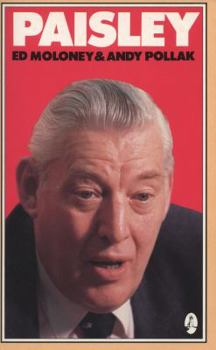Paisley
No Synopsis Available.
Format:Paperback
Language:English
ISBN:0905169751
ISBN13:9780905169750
Release Date:January 1986
Publisher:Dufour Editions
Length:400 Pages
Weight:0.80 lbs.
Customer Reviews
1 rating
Valuable, but bad-tempered.
Published by Thriftbooks.com User , 16 years ago
Firstly, any book by Ed Moloney in regard to Northern Ireland is a must-read. Also the Reverend Ian Paisley has been circling, if not inciting, the conflict in Northern Ireland since its most recent inception in the 1960's, so this book is a must-read. That said, I think it is disfigured by two major flaws - its complete distaste for its subject and its sense of historical inevitability. Paisley is portrayed as an opportunist, a political manipulator and a bully. He is shown to incite people to undertake protest without himself being around to take the consequences. In the 1950's a Catholic girl fled her parents house and was spirited away by members of Paisley's Free-Presbyterian Church, as the girl was under eighteen, this was a kidnapping. Paisley's reaction was to say `I do not know where the girl is, but if I did I would not tell'. Proclaim his innocence, which still inciting his followers. Moloney recounts this again and again, from the re-emergence of the UVF in the 1960s, Loyalist strikes of 1974 and 1977, to the emergence of the Third Force and Ulster Resistance. Eventually, those who undertook these actions - even it seems Peter Robinson, who was arrested in 1986 during an incursion into the Irish Republic - became disillusioned with his stance. It is striking that during the final stages of the negotiations which led to the Good Friday agreement, the parties representing loyalist paramilitaries barracked and insulted Paisley for his opposition. While all of the above is fact, the book is consistently hostile - there is almost no description of Paisley's motivation that can be described as positive. He discards colleagues, he is consistently negative, his method in pursuit of growth in terms of his church and his political party are portrayed as fomenting and exploiting divisions. This may all be true - indeed other journalists who I respect have recorded similar opinions, but surely a biography must try to explain how such a figure could have had such an influence. I am inclined to the view that unionist voters felt, throughout the troubles, that the British government would not carry out political change against their expressed will, and perhaps Paisley, by being so intransigent, was seen by them as an effective expression of their bottom line. I would have preferred more analysis of this, or any other thesis to explain his phenomenal success. Moloney's main thesis in the book is that Paisleyism and the Provisional IRA grew in a symbiotic relationship. This is a more plausible argument, though presumably anathema to both sides. The IRA would see itself as fighting the British state, with the unionists as proxies; however presumably under the guise of Sinn Fein, the IRA leadership came to see, and attempt to negotiate, with intransigent Unionism. Paisley's prophecies - that the civil rights movement would lead to IRA attacks, that the British might sign an Anglo-Irish agreement - became self-fulfilling. Moloney






